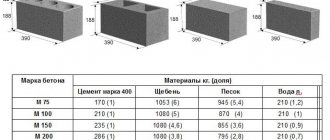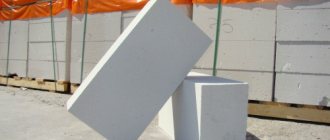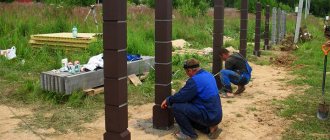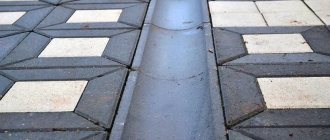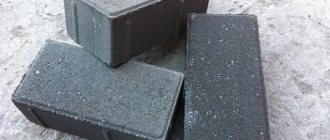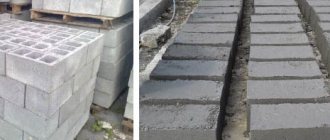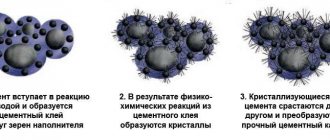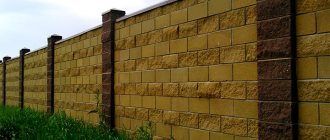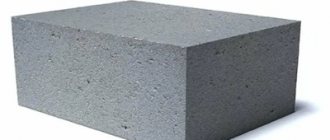Small-piece arbolite blocks
Probably, everyone who has independently engaged in block construction has at least once had the desire to purchase 400x200x200 mm concrete blocks for the full scope of work. In fact, the difference is only in size, but the strength is the same as that of standard wall blocks. But this is not entirely true, so let’s dig deeper into this issue to understand it thoroughly.
Standard size range of concrete blocks
Block private construction is very popular - and this is quite understandable. Working with piece products is easier for beginners in this field. Again, you can postpone construction indefinitely by purchasing material and laying it in stages.
And the cost of masonry work is slightly lower than that of monolithic work. In addition, special equipment is not needed, as with panel or monolithic concrete construction - again saving money.
For laying the foundation, such “babies” as concrete blocks 400x200x200 mm are not used.
This size can be found in products from:
- foam concrete;
- aerated concrete;
- expanded clay concrete;
- wood concrete;
- fiber concrete.
Emptiness – a plus or a minus?
Hollow blocks or with technical holes are used for the construction of walls. They are more profitable to use due to their lighter weight and the ability to be more convenient to hold in your hands. In addition, the existing air gap plays the role of additional insulation.
Attention! It is worth keeping in mind that it is precisely because of such technical voids that the overall strength of the block is reduced, even if it is made of high-quality concrete.
Another feature of hollow blocks is that they are not made of foam concrete or aerated concrete. This is due to the fact that the porous structure of the product does not have very high, and is not always stable, strength indicators.
Row and facing blocks are also produced. If the former need finishing, then the latter are fine with decorativeness.
Kawabanga! Polystyrene concrete: what is it, features, standard, varieties, home production
Again, the windows of construction counters are simply full of products made from colored concrete. It is profitable to buy such blocks, even though their price is higher than gray ones with a similar texture - this is a real saving of time, labor and money resources.
Solid products
Solid expanded clay concrete blocks 200 200 400 mm, however, like any other type of concrete, are found on sale much more often than hollow products of the same caliber. Rough and lined blocks of any color and texture are also produced.
For example, an expanded clay concrete block 200x200x400 mm, grade M150, weighs 11 kg, while a hollow one of the same format weighs no more than 9 kg. A noticeable difference, especially if we consider it from the point of view of the entire weight of the building being erected.
The video in this article will also talk about the almost limitless scope of application of such blocks.
Concrete blocks size 400x200x200
When constructing a building, it is important to create a strong and reliable foundation. Its service life depends on these qualities of the base. Concrete blocks 400x200x200 allow you to obtain not only a high-quality structure, but also significantly reduce construction time.
Peculiarities
Concrete block material measuring 400x200x200 is used not only for arranging foundations. The distinctive quality and performance parameters of the products are due to the control of all production stages in the production of this building material. Concrete blocks have the following characteristics:
- clearly maintained geometry and precise dimensions;
- small dimensions - 400x200x200;
- light weight - 30-33 kg;
- frost resistance;
- low thermal conductivity, so additional insulation is required to reduce heat loss in winter and coolness loss in summer;
- high water resistance;
- environmental friendliness,
- high density - 2300m/m3;
- durability.
The features of the technology for producing a concrete product with dimensions 400x200x200 include:
- use of heavy classes of concrete mixtures M250, M300;
- application of the vibrocompression stage at all production stages.
The above characteristics allow us to conclude that the 400x200x200 block allows you to build a structure that is resistant to deformation during operation, even under strong exposure to aggressive conditions.
Varieties
According to their structure, concrete blocks with dimensions 400x200x200 are divided into materials:
- hollow, intended for the construction of light partitions and main walls;
- solid, with the help of which they construct durable concrete structures that can withstand heavy loads.
According to their texture features, block elements are:
- rough with single grinding;
- chipped with a surface difference of no more than 8 mm;
- grooved or with symmetrical notches.
Species diversity of block material of the considered size:
- ordinary - materials that need further cladding;
- front - products with cladding on one or two sides.
Axial grooves can be made on the blocks on the supporting side. With their help, adhesion to concrete mortar is improved. The grooves are cut at a distance of more than 20 cm. Additionally, small indentations are made on the surface for comfortable grip, and tongues with ridges are made at the ends.
Areas of use
The use of concrete blocks 400x200x200 extends to all areas of construction. The material is suitable for the following actions:
- arrangement of heavy foundations that can support massive load-bearing walls;
- creation of basements and semi-basements;
- construction of columns for fences and fences;
- basement structures;
- arrangement of support systems;
- creating partitions and load-bearing walls.
Block concrete products of the considered size 400x200x200 have advantages over brickwork:
- high speed of construction work;
- significant savings in concrete solution;
- cost reduction.
The use of new technologies for the production of concrete blocks of this size range makes it possible to obtain even colored products. To do this, at the stage of mixing the ingredients for the production mixture, special pigments of inorganic origin are added: limonite, Prussian blue, manganese ore waste, ash, soot. The result is blocks with a durable color that does not fade or fade for a long time. This significantly expands the scope of application of the product as a decorative material. Such a block no longer requires additional cladding.
approximate cost
Solid block material can be made from lightweight concrete grades M100, M75. However, these products are not recommended for use in foundations, load-bearing walls and similar structures due to their low strength.
For more durable solid block products, heavy grades of fine-grained concrete with aggregates in the form of crushed stone, gravel, mountain sand, metallurgical slag with a grain size of up to 20 mm are used.
The cost of block material varies depending on the structure, raw materials and features.
When choosing a 400x200x200 building block, you don’t need to calculate how much it costs. First of all, you need to decide what properties the future building should have, and only then choose the material for its construction. It is important to evaluate the resistance to mechanical loads, aggressive influences, water resistance, and the possibility of further cladding of the selected product.
Below is a table with the approximate cost of products in the size range 400x200x200 mm, depending on the manufacturer.
kladembeton.ru
Production technology
A model illustrating the process of preparing and hardening a concrete solution will be a description of the process of pouring the form of a foundation or monolithic slab:
- Preparation of the form;
- Preparation of concrete solution;
- Pouring the solution into the mold;
- Compaction of the solution;
- Shrinkage of the mixture;
- Removing formwork;
- Final drying of the mixture and set of concrete working hardness.
The use of concrete with a high water content, on the contrary, does not entail the formation of a rigid shape, but the squeezing out of the mass of moisture, which is not able to withstand the rigidity given to it; it simply floats.
When preparing the solution, the order in which the components are added is observed: filler, cement, water, plasticizer.
Using a vibrating press, the following are formed:
- Solid wall block;
- Reinforced wall block with voids;
- Lightweight hollow wall block;
- Half block or half block;
Using a vibrating table and silicone molds, the following are produced:
- Facing block;
- Block imitating stone;
- Decorative tiles or elements for decorating facades, paths, fences.
Types of concrete blocks
What concrete blocks exist, sizes and prices, are indicated in this article.
Today, blocks with dimensions of 400x200x200 mm are actively used when it is necessary to fill a foundation or other structures that require great strength. The products in question are divided into two large types:
- hollow
- full-bodied
Hollow
You can find out how to use blocks for interior partitions in the article.
You can see in the article which is better to choose a gas block or foam block.
What is the price of wall blocks for external walls is indicated in the article.
Full-bodied
What types of cinder blocks exist can be found in this article.
You can find out what cinder blocks are, sizes and prices per piece, in this article.
Kawabanga! High-quality concrete preparation for the foundation: how to strengthen the foundation for a house, pouring technology, types of footing
With chipped surface
Concrete blocks may also have a chipped surface. In this case, the differences should not be more than 8 mm. You can buy concrete products with dimensions of 400x200x200 mm with a corrugated surface and symmetrical notches.
What is the composition of cinder block is indicated in the article.
In the video - concrete blocks with dimensions 400x200x200:
How to use glue for aerated concrete blocks can be read in the article.
Masonry made with concrete blocks has many advantages over brick:
- high speed of work;
- saving solution;
- reducing costs for mason services.
However, if you make wood concrete blocks with your own hands, you can achieve even greater savings.
- ocher;
- iron blue;
- manganese ore waste;
- soot;
- ash.
It is also useful to read about what wood concrete blocks are made from.
In this case, the fraction size should not be more than 20 mm. Taking into account the structures of the original ingredients, the price of a concrete block with dimensions of 400x200x200 mm may also change.
You can find out what the weight of 1 m3 of aerated concrete blocks is by reading this article.
Table 1 - Cost and manufacturers of concrete blocks
| Manufacturer | Block size, mm | Strength grade | Weight, kg | Price, rubles |
| MosOblStroy | 400x200x200 | M250 | 30 | 55 |
| Voskresensk | 28 | 75 | ||
| UnionStroyGroup | 200 |
Blocks for foundation construction
There are several technologies for constructing a foundation. You can do the usual filling, but it takes a lot of time and is very labor-intensive. The way out of this situation is to use specially designed reinforced concrete blocks for the foundation.
An example of a finished block foundation
They significantly simplify the process, reduce construction costs and save time. The price of such a base will be about one and a half times cheaper than a monolithic one, even taking into account the rented crane.
The range of foundation blocks produced is quite wide. They have different sizes, differ in shape and composition of the concrete mixture from which they are made.
FBS building blocks today are the ideal combination of quality and price, as well as an excellent material for creating strong and durable objects. The most popular concrete blocks for foundation construction are 200x200x400.
Return to contents
Classification and block sizes
Blocks for the foundation, depending on the classification, are designated as follows:
- FBS are solid, solid blocks that do not have any holes;
- FBPs are produced in the shape of the letter “P”, these are hollow blocks;
- FBV are blocks that have special cutouts; they are convenient to use if you plan to make any communications in the foundation underground.
Concrete blocks are divided according to their shape as follows:
- Wall. If you cut such a block, it will look like an ordinary quadrangle. In order for its installation to be more dense, specially designed cutouts are made on the sides;
- Pillow. In appearance, they resemble a trapezoid and have a large supporting area. It is for this reason that such blocks can be used when laying the foundation in the first rows. This will make the structure more stable.
Before purchasing blocks, you need to understand not only which ones to use, but also know exactly the required weight and dimensions.
Foundation option made of FBS blocks
The following size chart will help you determine this:
| Block type | Basic parameters of the block, mm | |||
| Length | Height | Width | Weight, kg | |
| FBS | 2380 | 580 | 300, 400, 500, 600 | 1300–1960 |
| 1180 | 280, 290, 580 | 300, 400, 500, 600 | 310–980 | |
| 880 | 580 | 300, 400, 500, 600 | 326–700 |
Material selection
Concrete blocks for the foundation can have smaller dimensions and weight, for example, there are some with dimensions 20 x 20 x 40, which weigh about 30 kg. Such blocks are stacked in several layers. They will allow you to easily and quickly translate even the most complex engineering solution into reality.
Foundation block 200x200x400
When manufactured, foundation blocks have standard dimensions:
- Width 200 mm
- Height 200 mm
- Length 400 mm
Moreover, the weight of one block is only 32 kg. Thus, a foundation block 200x200x400 is the optimal material when, for certain reasons, it is impossible to use heavy construction equipment on site.
Advantages of standard foundation blocks
Concrete block 200x200x400 is produced in the shape of a rectangle. Its production uses heavy concrete mortar (mainly class B7.5).
Modern technologies guarantee the quality of industrially produced fundamental concrete blocks. Technological processes and product geometry comply with GOST No. 6133-84 (Technical conditions).
GOST No. 13579-78 indicates the main parameters of products:
- Material strength -150 kg/cm²
- Frost resistance indicator – 15 cycles
- Thermal conductivity index – 1.15 W/m∙K
- Weight – 31.2/31.7 kg.
Types of blocks
Decorative ones cost 10-25% more, but in the future they do not require finishing and are used for facade masonry. Ordinary (ordinary) elements require surface cladding.
Kawabanga! Types and calculation of reinforced concrete floor beams
By purpose they are divided into the following types:
- Wall – hollow and solid building blocks.
- Foundation – solid concrete.
When choosing materials with dimensions 400x200x200, the determining factors are physical parameters (presence of cracks, voids, mass, strength), thermal conductivity and compliance with planned loads.
1. Concrete blocks with internal voids.
2. Fundamental solid.
It is recommended to purchase for laying load-bearing walls and the foundation of a house. The strength grade must be at least M150. They have no voids except for grip grooves.
- Possibility of laying foundations in hard-to-reach places without the use of lifting equipment.
- High speed of work.
- Lack of installation/dismantling of formwork.
- Independence from seasonal conditions.
Block elements are equally actively used for the installation of strip and pile foundations. After laying the foundation, you can immediately proceed to the construction of walls.
| Purpose | Type | Price, rub/piece |
| Wall | hollow | 35-65 |
| hollow colored | 52-115 | |
| full-bodied | 60-82 | |
| full-bodied colored | 90-110 | |
| For the foundation | full-bodied | 55-75 |
Prices for concrete blocks are based on the strength class, cost of raw materials, production work and transportation costs. The large cost difference is due to several reasons:
Application of concrete blocks measuring 400x200x200 mm
When choosing concrete blocks, parameters such as size and weight play an important role, and the product must correspond to the expected loads. The construction of industrial buildings requires large slabs and structures, the lifting of which requires special equipment. In private construction, on the contrary, it is more convenient to lay rectangular blocks measuring up to 400x200x200 mm, with a weight not exceeding 32 kg. Depending on the composition, processing method and characteristics, they are used to lay the foundation, base, load-bearing structures or partitions. The demand for concrete products is constantly growing, this is due to such advantages as: convenient dimensions for installation, affordable cost, strength and reliability.
Types and characteristics
The ingredients for making blocks are: cement, sand and water, the prepared mixture is poured into molds and undergoes vibrocompression. The main difference concerns the presence of voids; hollow and solid building structures are available for sale. Also, the composition may include expanded clay granules (cellular concrete) or another type of filler, but the proportion of the latter in 400x200x200 mm blocks is small. The size of the fractions is strictly controlled, they do not exceed 20 mm, crushed stone or gravel from hard rocks, and slag metallurgical waste are usually used.
Depending on the degree of surface treatment, there are: polished, smooth, corrugated and chipped wall textures. When concrete mortar is poured into high-quality molds and the vibropressing process is carried out correctly, the products are smooth, with slight roughness; differences of more than 8 mm are considered defective. Some blocks have only 1 or 2 finished sides (sometimes painted or with added inorganic pigments) and are used primarily for face masonry. Others, the so-called ordinary ones, require further finishing. Conditionally (by purpose) all blocks can be divided into:
- wall;
- foundation;
- septal
The main performance characteristics of building concrete blocks include:
1. Density: from 1350 to 2250 kg/m3.
2. Strength, depending on the severity of the concrete, products are produced in the range of 75–250 kg/cm2, less often - 300.
3. Frost resistance - at least 50 cycles.
4. Dimensions. In this case, up to 400x200x200 mm.
5. Weight: from 16 to 31 kg.
6. Thermal conductivity coefficient. It is influenced by the presence of a cellular structure, the value varies between 0.51–1.15 W/m∙°C.
7. Total volume of voids - up to 50%.
The price of concrete blocks depends on the strength class, wall thickness and quality of raw materials. Hollow ones are cheaper due to lower cement consumption during production, but rarely have a grade higher than M100. It is best to carry out wholesale purchases, with a preliminary calculation of the required amount of material.
Scope of application
The production of hollow concrete blocks is regulated by GOST 6133-99; the gaps in them can be through or hidden. These products are not capable of supporting the main weight of the building, so they are not used for laying the foundation. But hollow elements measuring up to 400x200x200 mm are indispensable for low-rise construction; they allow you to quickly erect walls or internal partitions and carry out cladding. It is allowed to erect foundations for light buildings such as a barn or a country house on non-heaving soils.
To lay a foundation or load-bearing walls, solid concrete blocks of 200x200x400 mm with a strength grade of M100 (the higher the better) are required. They have no voids, except for grip grooves. They are recommended to be purchased for the construction of support columns, when arranging basements with high humidity, and laying plinths. Strict requirements are put forward for this product; the durability of the entire building depends on it; you cannot skimp on quality or purchase goods from unverified suppliers.
A solid concrete foundation block 400x200x200 mm is the best option for constructing foundations without the use of cranes and other equipment. In addition to the possibility of laying in hard-to-reach places, its advantages include high speed of work.
There is no need to install/dismantle the formwork; after finishing the masonry, you can immediately begin the construction of the next floors. An additional advantage is the independence of the work process from the time of year (unlike pouring concrete). The disadvantage of such a foundation is the impossibility of creating a single monolithic structure, but in private construction this is irrelevant. In addition, the products are used not only for installing tape, but also for erecting piles.
Prices
Cost of concrete blocks measuring 400x200x200 mm:
| Name | Purpose | Strength grade, kg/cm2 | Weight, kg | Price for 1 piece, rubles |
| Hollow sand cement blocks | Low-rise buildings, garages, internal partitions | 100 | 20 | 45 |
| Expanded clay porous | 16 | |||
| Facing facial | For the construction of external walls without further processing | 20 | 60 | |
| Foundation solid | To create a strong load-bearing foundation, support columns, basement elements and plinths for single and multi-story buildings | 150 | 30 | 55 |
| 250 | 28 | 75 |
Features of foundation blocks
When building a private house, the available land plot does not always have access roads for construction equipment.
Main characteristics
- Dimensions 190*188*390 mm
- Weight 27kg
- Volumetric weight 2255kg
- Strength grade M100
- Frost resistance At least 60 cycles
- Thermal conductivity coefficient 1.16
Depending on the degree of surface treatment, the following is produced:
- Smooth.
- Corrugated.
- Polished.
- Chipped textures.
According to their purpose, these blocks are divided:
- Wall.
- Fundamental.
- Septal.
Advantages
Compared to brick, these elements have a number of advantages:
Flaws
- The main disadvantage of foundation blocks is the high consumption of masonry mortar, since the seams in the enclosing structure, when laying from such elements, are much thicker.
- Not high vapor permeability. Walls made of such material cannot be called breathable.
- During the construction process, cracks and crevices form. Waterproofing is a must.
Foundation concrete blocks 400x200x200
Foundation concrete blocks 400x200x200 are manufactured in accordance with GOST 6133-99.
Weight 30 kg
Strength M200
Clear geometry!______________________________________________________________………………………… ADVANTAGES…………………………….Own production.European equipment.Delivery of products directly from the factory, WITHOUT INTERMEDIARIES!Minimum prices!Order from 100 pcs. We work with or without a contract.
SEVEN DAYS A WEEK.
____________________________________________________________………………………………CHARACTERISTIC…………………………………
Foundation concrete blocks 400x200x200 Dimensions: 400x200x200 mm Weight: 30 kg Color: gray
Quantity on pallet: 60 pcs
_________________________________________________________
………………………………PAYMENT AND DELIVERY…………………………….Cash/non-cash payment.Order tiles WITHOUT ADVANCE PAYMENT, regular customers - DELAYED PAYMENT.Delivery time as agreed from 7 hours .Compensation for violation of deadlines - FREE delivery. ____________________________________________________________…………………………….QUALITY GUARANTEE……………………………..Availability of quality certificates and quality passports.____________________________________________________________.____………… ..ADDITIONAL INFORMATION: We sell expanded clay concrete, sand cement, concrete, sand concrete blocks, paving slabs, curbs, cement directly from the factory since 2010 in St. Petersburg and L.O. We will help with block laying and block construction. We pour the foundations..We offer you to buy blocks for building a house, cottage, bathhouse, garage, for partition walls at a low price (cheap) not used. Everything is in stock..
Call now!
www.avito.ru
